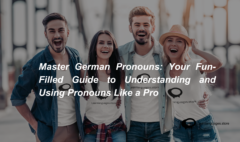Mastering Basic Conjunctions in German: A Comprehensive Guide
Mastering Basic Conjunctions in German: A Comprehensive Guide
Estimated reading time: 6 minutes
Welcome to the Learn Languages Store blog! In today’s lesson, we will explore an essential aspect of German grammar: basic conjunctions. Understanding conjunctions is crucial for constructing clear and complex sentences in German. By the end of this guide, you will be familiar with the most common coordinating conjunctions and how to use them effectively.

What Are Conjunctions?
Conjunctions are words that connect clauses, sentences, or words. In German, there are two main types of conjunctions: coordinating and subordinating. In this blog, we will focus on coordinating conjunctions.
Common Coordinating Conjunctions in German
The most common coordinating conjunctions in German include:
- und – and
- oder – or
- aber – but
- denn – for/because
- sondern – but rather
Understanding how to use these conjunctions correctly will enhance your fluency in German.
Example Sentences for Each Conjunction
1. und (and)
Example Sentences:
- Sentence: Ich mag Äpfel und Bananen.
Translation: I like apples and bananas.
Pronunciation: इच माग एपफेल उंड बनानेन - Sentence: Er spielt Fußball und Tennis.
Translation: He plays football and tennis.
Pronunciation: एयर श्पील्ट फूज्बाल उंड टेनिस - Sentence: Wir gehen ins Kino und danach essen wir.
Translation: We go to the cinema and afterwards we eat.
Pronunciation: वीर गेहेन इन्स कीनो उंड दानच एसेन वीर - Sentence: Sie liebt Bücher und Filme.
Translation: She loves books and movies.
Pronunciation: ज़ी लिब्ट बुखेर उंड फिलमे - Sentence: Ich habe einen Hund und eine Katze.
Translation: I have a dog and a cat.
Pronunciation: इच हाबे आइनेन हंड उंड आइने काट्जे
2. oder (or)
Example Sentences:
- Sentence: Möchtest du Kaffee oder Tee?
Translation: Would you like coffee or tea?
Pronunciation: म्योक्टेस्ट डू कैफे ओडर टे - Sentence: Gehen wir ins Theater oder ins Kino?
Translation: Shall we go to the theater or to the cinema?
Pronunciation: गेहेन वीर इन्स थिएटर ओडर इन्स कीनो - Sentence: Ich kann schwimmen oder radfahren.
Translation: I can swim or ride a bike.
Pronunciation: इच कन्न श्विम्मेन ओडर राडफरन - Sentence: Er isst Pizza oder Pasta.
Translation: He eats pizza or pasta.
Pronunciation: एयर इस्ट पिज्जा ओडर पास्ता - Sentence: Willst du nach Paris oder nach Berlin?
Translation: Do you want to go to Paris or to Berlin?
Pronunciation: विल्स्ट डू नाख पेरिस ओडर नाख बर्लिन
-
Product on sale
 German B1
German B1₹32,600.00
₹42,600.00 -
Product on sale
 German A2
German A2₹24,300.00
₹32,600.00
3. aber (but)
Example Sentences:
- Sentence: Ich mag Kaffee, aber ich trinke Tee.
Translation: I like coffee, but I drink tea.
Pronunciation: इच माग कैफे, अबेर इच ट्रिंके टे - Sentence: Es regnet, aber ich gehe spazieren.
Translation: It’s raining, but I’m going for a walk.
Pronunciation: एस रेग्नेट, अबेर इच गेहे स्पा-ज़ीरन - Sentence: Er ist groß, aber sie ist kleiner.
Translation: He is tall, but she is shorter.
Pronunciation: एयर इस्ट ग्रॉस, अबेर ज़ी इस्ट क्लाइनर - Sentence: Ich wollte gehen, aber ich habe keine Zeit.
Translation: I wanted to go, but I have no time.
Pronunciation: इच वोल्टे गेहेन, अबेर इच हाबे केइने ज़ाइट - Sentence: Sie ist nett, aber manchmal unhöflich.
Translation: She is nice, but sometimes rude.
Pronunciation: ज़ी इस्ट नेट, अबेर मान्चमल उन-हैफ्लिश
4. denn (for/because)
Example Sentences:
- Sentence: Ich bleibe zu Hause, denn es regnet.
Translation: I stay at home because it’s raining.
Pronunciation: इच ब्लाइबे त्सु हाउसे, डेन एस रेग्नेट - Sentence: Sie ist müde, denn sie hat nicht geschlafen.
Translation: She is tired because she didn’t sleep.
Pronunciation: ज़ी इस्ट म्यूडे, डेन ज़ी हाट निच्ट गेश्लाफेन - Sentence: Ich esse, denn ich habe Hunger.
Translation: I eat because I am hungry.
Pronunciation: इच एसे, डेन इच हाबे हंगर - Sentence: Er bleibt zu Hause, denn er ist krank.
Translation: He stays at home because he is sick.
Pronunciation: एयर ब्लाइब्ट त्सु हाउसे, डेन एयर इस्ट क्रांक - Sentence: Wir gehen früh ins Bett, denn morgen haben wir viel zu tun.
Translation: We go to bed early because we have a lot to do tomorrow.
Pronunciation: वीर गेहेन फ्रूइं इन्स बेट, डेन मॉर्गेन हाबेन वीर फील त्सु तून
5. sondern (but rather)
Example Sentences:
- Sentence: Ich mag kein Fleisch, sondern Gemüse.
Translation: I don’t like meat, but rather vegetables.
Pronunciation: इच माग केइन फ्लेश, जॉंदर्न गेम्यूसे - Sentence: Sie spricht nicht nur Englisch, sondern auch Deutsch.
Translation: She speaks not only English, but also German.
Pronunciation: ज़ी श्प्रिख्त निच्ट नूर इंग्लिश, जॉंदर्न आउच डोइच - Sentence: Er ist nicht faul, sondern sehr fleißig.
Translation: He is not lazy, but rather very hardworking.
Pronunciation: एयर इस्ट निच्ट फॉल, जॉंदर्न ज़ेर फलाईसिग - Sentence: Wir kaufen kein Auto, sondern ein Fahrrad.
Translation: We are not buying a car, but rather a bike.
Pronunciation: वीर काउफेन केइन ऑटो, जॉंदर्न आइनेन फारहड - Sentence: Das ist nicht mein Buch, sondern dein.
Translation: That is not my book, but rather yours.
Pronunciation: दास इस्ट निच्ट माइन बुख, जॉंदर्न डाइन
Enhance Your German Skills!
Now that you’ve learned about basic conjunctions in German, it’s time to take your language skills to the next level! At Learn Languages Store, we offer a comprehensive A1 Level German Course for just Rs. 16,300. This course will provide you with the essential skills needed to communicate effectively in German.
Contact Us to Learn More!
For more information about our courses, please reach out to us at:
Address:
330, 3rd Floor, Big Splash (Near Vashi Bus Depot),
Sector 17, Vashi,
Navi Mumbai, Maharashtra 400703
Phone: +91-9594113111
Email: services@learnlanguages.store
Don’t miss out on the opportunity to improve your language skills! Sign up today and embark on your journey to fluency in German!










